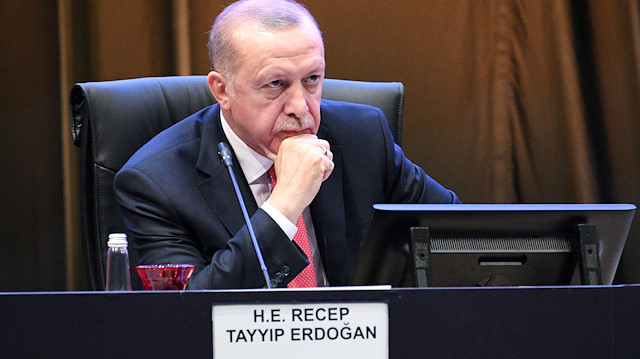Erdoğan says 50,000 Syrians fleeing Idlib to Turkey

Turkish President Tayyip Erdogan said on Thursday that 50,000 people were fleeing Syria's northwestern region of Idlib to Turkey, and slammed Muslim nations for not supporting his plans to resettle refugees in other parts of north Syria.
Turkey currently hosts some 3.7 million Syrian refugees, the largest refugee population in the world, and fears another influx from the Idlib region, where up to 3 million Syrians live in the last significant opposition-held swathe of territory. Syrian and Russian forces carry out regular air strikes against targets in Idlib, which President Bashar al-Assad has vowed to recapture, pushing more people towards the Turkish border.
"Look, 50,000 people are once again coming from Idlib to our lands," Erdogan told a meeting of Muslim leaders in Malaysia. "We already have 4 million people, and now another 50,000 are coming and this may increase."
He gave no details and did not say whether the Syrians had actually crossed into Turkey, which has built a wall along its 911 km (570 mile) southern border since the outbreak of Syria's eight-year conflict.
Erdogan is seeking international support for plans to settle 1 million Syrians in part of northeast Syria which Turkish forces and their Syrian opposition allies seized from the YPG terror group in a cross-border operation in October.
Ankara has received little public backing for its plans and Erdogan said that world powers, including Muslim nations, were more concerned about sending arms to Syria than supporting a Turkish "safe zone".
"Is the Muslim world that poor? Why don't they support this?" he said. "Even if they just gave their alms, there would no poverty here, no have-nots," he said.
"They provide no support when we call on them to form a safe zone, but when it comes to weapons, the arms come," he said.
In its third operation into northern Syria in three years, Turkey seized a 120 km (75 mile) stretch of border territory two months ago from the YPG, which had spearheaded the fight against Daesh in Syria with U.S. support.
Washington's backing for the YPG has infuriated Turkey, which considers it a terrorist group because of its links to the Kurdistan Workers Party (PKK) which has waged an insurgency in southeast Turkey in which thousands of people have been killed.
Reklam yükleniyor...
Reklam yükleniyor...







Comments you share on our site are a valuable resource for other users. Please be respectful of different opinions and other users. Avoid using rude, aggressive, derogatory, or discriminatory language.